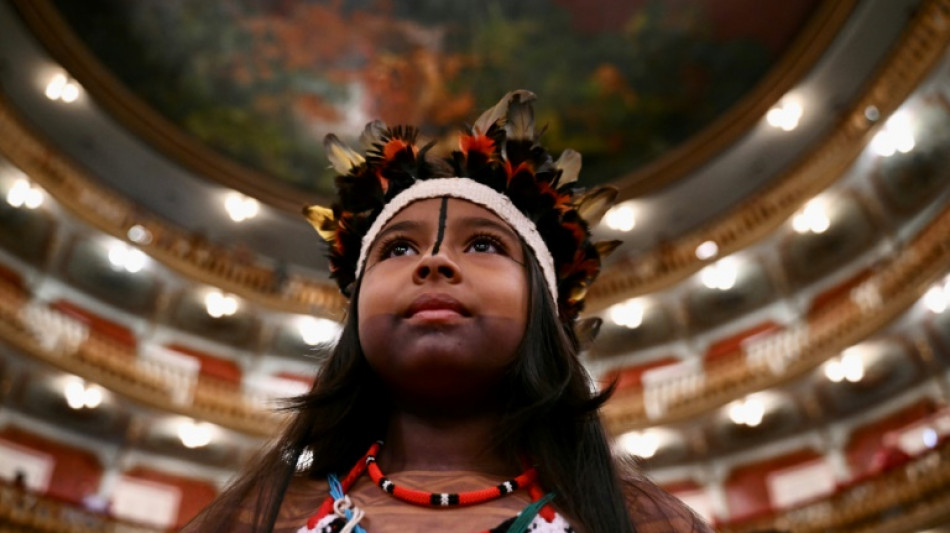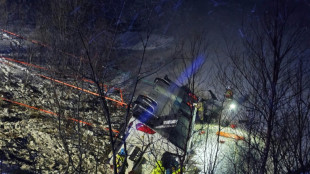
-
 South Korea's acting president faces impeachment vote
South Korea's acting president faces impeachment vote
-
Fleeing Myanmar, Rohingya refugees recall horror of war

-
 Smith century puts Australia in control of 4th Test against India
Smith century puts Australia in control of 4th Test against India
-
Israeli strikes hit Yemen as Netanyahu fires warning

-
 Peru ex-official denies running Congress prostitution ring
Peru ex-official denies running Congress prostitution ring
-
Australia's Smith reaches 34th Test century

-
 NHL Red Wings fire Lalonde and name McLellan as head coach
NHL Red Wings fire Lalonde and name McLellan as head coach
-
Injured Halep withdraws from Australian Open

-
 Liverpool power seven points clear, Man Utd crash at Wolves
Liverpool power seven points clear, Man Utd crash at Wolves
-
Leaders Liverpool survive Leicester scare to go seven points clear

-
 Membership of UK's anti-immigration Reform party surpasses Conservatives
Membership of UK's anti-immigration Reform party surpasses Conservatives
-
Two dead in treacherous Sydney-Hobart yacht race

-
 Amorim warns of 'long journey' ahead for miserable Man Utd
Amorim warns of 'long journey' ahead for miserable Man Utd
-
Three dead, four injured in Norway bus accident

-
 Man Utd fall to Wolves as Fernandes sees red
Man Utd fall to Wolves as Fernandes sees red
-
Fernandes sent off as Man Utd crash at Wolves, troubled Man City held by Everton

-
 'Logical' that fatigued Spurs are faltering - Postecoglou
'Logical' that fatigued Spurs are faltering - Postecoglou
-
Manmohan Singh: technocrat who became India's accidental PM

-
 India's former PM Manmohan Singh dies aged 92
India's former PM Manmohan Singh dies aged 92
-
Acid risk contained in deadly Brazil bridge collapse

-
 Chelsea stunned by Fulham in blow to Premier League title hopes
Chelsea stunned by Fulham in blow to Premier League title hopes
-
Troubled Man City held by lowly Everton, Chelsea title bid rocked

-
 Paterson, Bosch give South Africa edge over Pakistan in first Test
Paterson, Bosch give South Africa edge over Pakistan in first Test
-
Oil leak in Peru tourist zone triggers 'environmental emergency'

-
 Mozambique post-election violence kills 125 in three days: NGO
Mozambique post-election violence kills 125 in three days: NGO
-
Finns probing ship from Russia for 'sabotage' of cables

-
 Williams hits unbeaten 145 as Zimbabwe make Afghanistan toil
Williams hits unbeaten 145 as Zimbabwe make Afghanistan toil
-
Bowlers bring Pakistan back into first Test in South Africa

-
 Banbridge foils French to land King George VI Chase for Ireland
Banbridge foils French to land King George VI Chase for Ireland
-
Man City pay penalty for Haaland miss in Everton draw

-
 Paterson takes five wickets as Pakistan bowled out for 211
Paterson takes five wickets as Pakistan bowled out for 211
-
Kremlin cautions on 'hypotheses' over plane crash

-
 Pakistan military convicts 60 more civilians of pro-Khan unrest
Pakistan military convicts 60 more civilians of pro-Khan unrest
-
Turkey lowers interest rate to 47.5 percent

-
 Syria authorities launch operation in Assad stronghold
Syria authorities launch operation in Assad stronghold
-
Record number of migrants lost at sea bound for Spain in 2024: NGO

-
 Kohli called out over shoulder bump with Konstas during fourth Test
Kohli called out over shoulder bump with Konstas during fourth Test
-
Rural communities urged to flee east Australia bushfire

-
 Sri Lanka train memorial honours tsunami tragedy
Sri Lanka train memorial honours tsunami tragedy
-
S. Korea's opposition moves to impeach acting president

-
 'We couldn't find their bodies': Indonesian tsunami survivors mourn the dead
'We couldn't find their bodies': Indonesian tsunami survivors mourn the dead
-
Lakers pip Warriors after another LeBron-Curry classic

-
 India readies for 400 million pilgrims at mammoth festival
India readies for 400 million pilgrims at mammoth festival
-
Nepal hosts hot air balloon festival

-
 Asia stocks up as 'Santa Rally' persists
Asia stocks up as 'Santa Rally' persists
-
Tears, prayers as Asia mourns tsunami dead 20 years on

-
 Sydney-Hobart yacht crews set off on gale-threatened race
Sydney-Hobart yacht crews set off on gale-threatened race
-
Key public service makes quiet return in Gaza

-
 Fearless Konstas slams 60 as Australia take upper hand against India
Fearless Konstas slams 60 as Australia take upper hand against India
-
Hungry Sabalenka ready for more Slam success


South America seeks roadmap to save Amazon at 'landmark' summit
Brazilian President Luiz Inacio Lula da Silva opened what he called a "landmark" summit Tuesday where South American leaders will seek a roadmap to save the Amazon rainforest.
Lula vowed to seek ambitious pledges to stop the destruction of the world's biggest rainforest at the two-day meeting of the Amazon Cooperation Treaty Organization (ACTO) in the northern city of Belem.
"This is a landmark meeting. It will mark a turning point in the history of protecting the Amazon and the green transition," the veteran leftist said before opening the gathering at the mouth of the Amazon river.
It is the first summit in 14 years for the eight-nation group, set up in 1995 by the South American countries that share the Amazon basin: Bolivia, Brazil, Colombia, Ecuador, Guyana, Peru, Suriname and Venezuela.
Home to an estimated 10 percent of Earth's biodiversity, 50 million people and hundreds of billions of trees, the vast Amazon is a vital carbon sink, curbing global warming.
But scientists warn the destruction of the rainforest is pushing it dangerously close to a "tipping point," beyond which trees would die off and release carbon rather than absorb it, with catastrophic consequences for the climate.
The region's countries are determined "not to let the Amazon reach a point of no return," Brazilian Environment Minister Marina Silva told a ministerial meeting ahead of the summit.
Lula wants the summit to strengthen the ACTO and produce a joint declaration with a bold action plan to stop deforestation.
The summit is also something of a dress rehearsal for the 2025 UN climate talks, which Belem will host.
- Brazil, Colombia: competing priorities -
Deforestation in the Amazon is driven mainly by cattle ranching, though it is fueled by a murky mix of corruption, land-grabbing and organized crime whose tentacles extend to the illegal trafficking of drugs, arms, timber and gold.
In Brazil, the world's top exporter of beef and soy and home to 60 percent of the Amazon, the destruction has already wiped out around one-fifth of the rainforest.
Environmental groups are pressuring all eight countries to adopt Brazil's pledge to eradicate illegal deforestation by 2030, though Brazilian officials have indicated those negotiations may need more time.
Colombian President Gustavo Petro is meanwhile pushing other countries to adhere to his pledge to ban all new oil exploration -- a touchy subject for oil-rich Venezuela and also Brazil, whose state-run oil company, Petrobras, is controversially seeking to explore new offshore blocs at the mouth of the Amazon river itself.
Ecuador is due to hold a referendum this month on whether to stop drilling for crude on a strategic oil block located within the Yasuni Indigenous reservation, the source of 12 percent of the country's oil output.
Colombian Environment Minister Susana Muhamad for her part called for the final declaration to include a goal of preserving 80 percent of the Amazon by 2025, in line with Indigenous groups' demands.
Brazil is also calling for the summit to create an international police task force for the region and a scientific research group modeled on the Intergovernmental Panel on Climate Change (IPCC), the advisory board to the UN climate talks.
- Lula test -
Lula, Petro, Bolivian President Luis Arce, and Peru's Dina Boluarte were all present for the summit.
Venezuelan President Nicolas Maduro, absent due to an ear infection, sent Vice President Delcy Rodriguez, while Ecuador, Guyana and Surinam were represented by high-level officials.
The summit is a key test for Lula, who previously served as president from 2003 to 2010 and returned to office in January vowing "Brazil is back" in the fight against climate change, after four years of surging destruction in the Amazon under his far-right predecessor, Jair Bolsonaro.
The summit "should deliver concrete results if the region is serious about becoming a leader in climate action," said US-based activist group Avaaz.
Indigenous groups -- whose protected reservations are crucial buffers against the destruction of the world's forests, according to experts -- urged South American leaders to take bold actions.
"The presidents here and around the world need to hear us," said iconic Brazilian Indigenous chief Raoni.
"If they don't stop deforestation, we're going to face far bigger problems."
E.Paulino--PC



